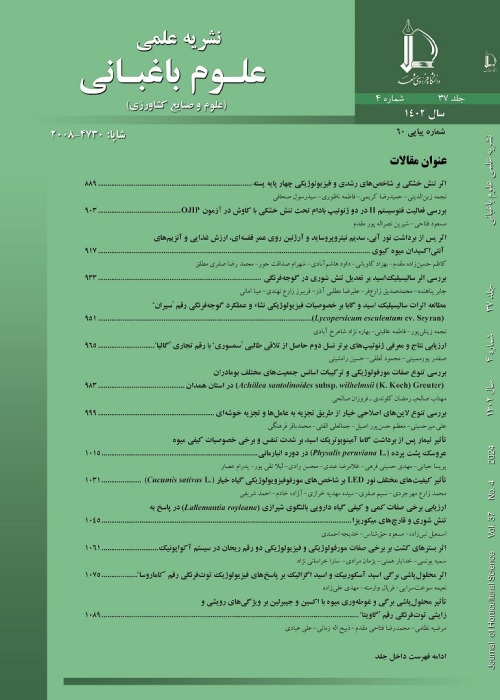Investigation the Effects of Water Stress and Different Levels of Vermicompost and Potassium Sulfate on some Quantitative and Qualitative Characteristics of Redgold Nectarine
Environmental stresses are the most important factors that reduce agricultural yield all over the world. The water stress especially in flowering damages yield and yield quality, however, some studies showed that sometimes it does not have any harmful effect on yield. For instance, some studies approved that deficit irrigation improves sugar content and then fruit quality. Therefore, in order to evaluate the effects of potassium sulfate, vermicompost and water stress on yield and quality of four years old nectarine (CV Red gold), an experimental study was carried out on a garden which covers 5000 m2 in Eslamdeh (Sari) during 2015 to 2016.
A split-split plot experiment based on complete randomized block design (RCBD) with 18 treatments in three replications (totally 54 treatments (trees)) was used in this study. Some complex soil samples were gathered individually from 0-30 and 30-60 cm to determine macro and micro fertilizer demand and were analyzed to determine physicochemical characteristics. Two levels of tree water requirement (50% and 100%) as the main plot, vermicompost in three levels (0, 5 and 10 kg per tree) as subplot, and three levels of potassium sulfate, (0, 200 and 400 g per tree) as sub-sub plothad been applied. The rest fertilizer demand was recommended based on soil analysis. vermicompost, potassium sulfate and other essential fertilizers were applied in late winter and then aeration or digging was carried out. The fruit was picked after ripening and was weighed. Diameter, height and mass weight were measured. Soluble solids, the total sugar content of fruit was measured based on pH-meter, refractometer and Arnon methods. Potassium and chlorophyll were measured by flame photometer and chlorophyll meter.
The results showed that the effects of different levels of applied treatments were not significant on fruit pH. In addition, effects of different levels of potassium sulfate on TSS, leaf chlorophyll, potassium sulfate levels of leaf, fruit weight and yield, fruit height, and flesh weight, single fruit weight were all significant at 1 % level. The results also showed that levels of vermicompost on K level of leaf and fruit yield was significant at 1% level, and on fruit weight at 5% level. Effects of other treatments were not significant on other studied traits. Results of mean comparison showed that fruit crop was increased with an increase in vermicompost application. The minimum yield (41.44 kg/fruit) obtained from control and application of 10 and 20 kg/h vermicompost resulted in 58.33 and 60.61 kg/h, respectively. Application of potassium sulfate also showed to be effective on fruit yield. The minimum yield obtained from control, applying 200, 400 g of potassium sulfate, resulted in 54.89 and 61.33 kg/tree. Furthermore, potassium sulfate levels resulted in TSS enhancement. The minimum obtained from control plot (8.083) and maximum obtained from 8.864 and 9.612 with applying 200, 400 g of potassium sulfate, respectively. Potassium application also resulted in fruit level volume. The minimum level observed at control plot (116.2), applying 200, 400 g of potassium sulfate, resulted in 131.5 and 141.3 kg/tree. The interaction effects of different levels of potassium sulfate, vermicompost and irrigation showed that maximum fruit yield obtained from 400 g/K, 10 kg of vermicompost and applying 100% tree water requirement with yield of 70.66 g which was not statistically different with triple interaction of 400 g/K, 10 kg of vermicompost and applying 50% of tree water requirement.
In the current research, the effects of the use of potassium sulfate and vermicompost on maintaining plant balance and fruit quality and also decreasing water use in stress conditions were studied. Results showed that the use of potassium sulfate along with vermicomposts had a significant effect of improving morphological and physiological characteristics of nectarine. Furthermore, they increased nutrition availability for the crop and then increased yield and fruit quality. The following conclusion to be drawn is that fruit was increased with an increase in vermicompost application. Application of potassium sulfate also showed to be effective on fruit yield and TSS enhancement. The interaction effects of different levels of potassium sulfate, vermicompost and irrigation showed that maximum fruit yield obtained from 400 g/K, 10 kg of organic matter and applying 100% tree water requirement with yield of 70.66 g which was not statistically different with triple interaction of 400 g/K, 10 kg of vermicompost and applying 50 % tree water requirement.
- حق عضویت دریافتی صرف حمایت از نشریات عضو و نگهداری، تکمیل و توسعه مگیران میشود.
- پرداخت حق اشتراک و دانلود مقالات اجازه بازنشر آن در سایر رسانههای چاپی و دیجیتال را به کاربر نمیدهد.


